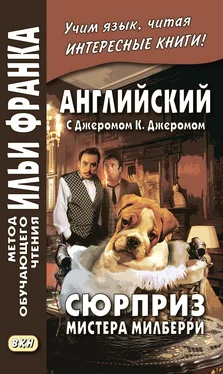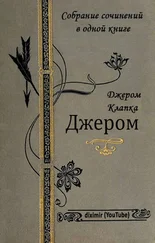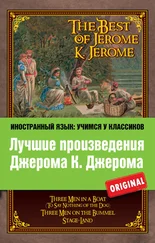“Why, women – that they can tell one baby from another, without its clothes(да женщины, /утверждающие/ что они могут отличить одного младенца от другого, /когда те/ без одежды; why – почему? зачем?; как, да, ну /выражает нетерпение, удивление, согласие/; to tell – говорить; рассказывать; отличать, различать; baby – младенец, ребенок, дитя ) . I've got a sister, a monthly nurse(у меня есть сестра, нянька, ухаживающая за малышами; I've = I have; to have got – иметь, обладать; to get – получать; monthly – /еже/месячный; month – месяц; nurse – няня, нянька ) , and she will tell you for a fact, if you care to ask her(и она вам скажет наверняка/уверенно, если вы изволите ее спросить; for a fact – факт, событие; истина, реальность; to care – беспокоиться, тревожиться; иметь желание, хотеть ) , that up to three months of age there isn't really any difference between 'em(что до трех месяцев /возраста/ вообще нет никакой разницы между ними; really – в действительности, на самом деле; difference – разница; различие ).
sardine [sɑ:'di:n] , question ['kwesʧ(ǝ)n] , purpose ['pɜ:pǝs] , hors d'oeuvre [,ɔ:'dɜ:v] , endeavouring [ɪn'devǝrɪŋ] , rescue ['reskju:] , women ['wɪmɪn]
We had been discussing the question whether sardines served their purpose better as a hors d'oeuvre or as a savoury; and I found myself wondering for the moment why sardines, above all other fish, should be of an unbelieving nature; while endeavouring to picture to myself the costume best adapted to display the somewhat difficult figure of a sardine. Henry put down his glass, and came to my rescue with the necessary explanation.
“Why, women – that they can tell one baby from another, without its clothes. I've got a sister, a monthly nurse, and she will tell you for a fact, if you care to ask her, that up to three months of age there isn't really any difference between 'em.
You can tell a girl from a boy(вы сможете отличить девочку от мальчика) and a Christian child from a black heathen, perhaps(и христианское дитя от чернокожего язычника, возможно; child – ребенок, дитя; black – черный; темнокожий, чернокожий ) ; but to fancy you can put your finger on an unclothed infant and say(но представить, что вы сможете указать пальцем на раздетого младенца и сказать; to fancy – воображать, представлять себе; /пред/полагать; to put one's finger on – распознать; указать /пальцем/: «положить палец на»; to clothe – одевать ) : ‘That's a Smith, or that's a Jones,' as the case may be(«Это Смит или это Джонс», смотря по обстоятельствам: «как случай может быть»; case – случай; обстоятельство, положение дел ) – why, it's sheer nonsense(да это сущая чепуха; sheer – абсолютный, сущий, полнейший; nonsense – вздор, ерунда, чепуха ) . Take the things off 'em(снимите с них одежду; to take off – снимать; убирать, уносить; to take – брать; thing – вещь, предмет; things – носильные вещи; одежда ) , and shake them up in a blanket(перемешайте их в одеяле; to shake – трясти, встряхивать; взбалтывать; to shake up – реорганизовать, основательно перетрясти /структуру, кадры/; blanket – шерстяное одеяло ) , and I'll bet you what you like(и я поспорю на что хотите; I'll = I will; to bet – держать пари, биться об заклад; bet – пари; ставка /в пари/ ) that which is which you'd never be able to tell again so long as you lived(что кто из них кто вы никогда не смогли бы снова сказать, так долго, как вы жили = вы никогда бы в жизни не сказали; which – какой, который; you'd = you would; able – способный; to be able to do smth. – мочь, быть в состоянии сделать что-л.; so long as – /до тех пор/ пока; long – длинный; долгий, продолжительный ) .”
I agreed with Henry(я согласился с Генри) , so far as my own personal powers of discrimination might be concerned(что касается = исходя из моих собственных способностей различать /младенцев/; so far as – настолько: «так далеко, как»; personal – персональный, личный; power – сила, мощь; powers – физическая или умственная способность; discrimination – различение; установление различий; способность различать; to discriminate – отличать, различать; to concern – касаться, затрагивать ) , but I suggested that to Mrs. Jones or Mrs. Smith there would surely occur some means of identification(но предположил, что миссис Джонс или миссис Смит наверняка придет в голову какой-нибудь способ опознавания /своего ребенка/; to suggest – предлагать, советовать; выдвигать предположение; surely – конечно; несомненно; sure – уверенный; несомненный, верный; Mrs. = Mistress; to occur – случаться, происходить; приходить на ум; means – средство, способ; identification – опознавание; установление личности ).
Christian['krɪsʧǝn; 'krɪstɪǝn] , perhaps[pǝ'hæps] , unclothed[ʌn'klǝʋðd] , infant['ɪnfǝnt] , powers['paʋǝz] , occur[ǝ'kɜ:] , identification[aɪ,dentɪfɪ'keɪʃ(ǝ)n]
You can tell a girl from a boy and a Christian child from a black heathen, perhaps; but to fancy you can put your finger on an unclothed infant and say: ‘That's a Smith, or that's a Jones,' as the case may be – why, it's sheer nonsense. Take the things off 'em, and shake them up in a blanket, and I'll bet you what you like that which is which you'd never be able to tell again so long as you lived.”
I agreed with Henry, so far as my own personal powers of discrimination might be concerned, but I suggested that to Mrs. Jones or Mrs. Smith there would surely occur some means of identification.
Читать дальше











